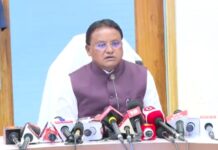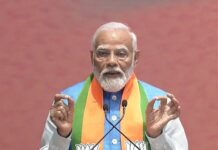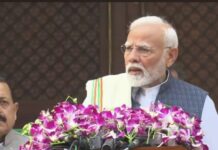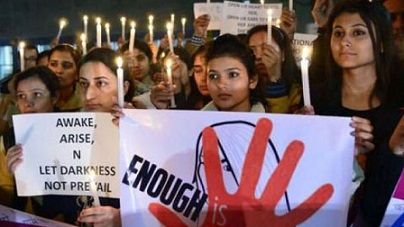By Dr Bhabani Shankar Nayak
LONDON: Mass movements are not always oppositional movements. The mass movements can be offensive, defensive and alternative at the same time. It offers progressive alternatives to face and recover from various crisis. Mass movements establish lasting solidarities between different social, religious, cultural, economic, political and professional groups. It helps to overcome the old barriers and established fault lines of regressive societies. Mass movements shapes our present and fortifies our progressive future.
India desperately needs a mass movement today to save itself from the ruining path paved by the predatory, neoliberal, and capitalist Hindutva forces. These forces are the products of upper caste and class alliance represented by the RSS and BJP. It truly serves their purpose of empowering higher caste and class people in India under the veil of fake nationalism of the RSS and BJP. These forces further aggravate the structural malaises in Indian society. Therefore, Indians are in a critical movement in the history, and need to decide on various critical questions that is affecting the future of national life, peace, prosperity, unity, integrity, and progress of India.
The people’s manifesto for India’s future depends on secular, liberal and democratic mass movements based on following five concrete ideological pillars of policy proposals.
Indian society is destroyed by centuries long apartheid practices based on Hindu caste order which was institutionalised by the British colonialism and strengthened by the Hindutva politics. The caste discrimination denies the constitutional citizenship rights and works as an impediment in the growth of egalitarian society in India. The anti-Muslim politics of Hindutva forces led by BJP and RSS have destroyed the existing social solidarity between Hindus and Muslims by promoting the politics of hate and Islamophobia. The lynching and genocide of Muslims in India led to an environment of fear, which created the trust deficit in Indian democracy. The innocent Indian Muslims are made to feel foreigner in their own land.
The regional discrimination of north east Indians, Kashmiris, tribals, Dalits, women and rural poor is a threat to national unity and integrity. Therefore, the pan Indian mass movements for alternatives need to understand, acknowledge, apologise and rebuild the trust based on equal citizenship rights an enshrined in Indian constitution. The alternative manifestos for mass movements need to incorporate ideals of anti-caste movements and ensure to end Islamophobia and defeat all forms of social discrimination. It should vigorously oppose all attempts to solve the economic crisis by discrimination and scapegoating on caste, religion, gender, sexuality, regional and racial grounds. Social solidarity and peaceful coexistence can only rebuild the society and economy in India.
The centralisation project within Indian constitution helps in the growth of capitalist economy in India. The financial decentralisation and autonomy of the states are important to revive cooperative federalism in India which can promote cooperative economy. The centralised economic planning for development and economic growth based on ideals of neoliberal capitalism further marginalised the lower caste, tribals, farmers, rural and urban poor. The national parties like the Indian National Congress and BJP followed this ruinous path.
There is absolutely no difference between BJP and Congress when it comes to economic policies. But when it comes to valiant defence of corporate capitalism, BJP stands out in open. The economic policies pursued by the BJP government led by Narendra Modi marginalise the masses. It ruined all regulatory mechanisms to support the capitalist classes. It provides tax breaks and stimulus packages to the rich and destroys livelihoods and employment opportunities for many. The economic austerity is not an economic policy but a political choice followed by the BJP government to empower the capitalist elites in the country. The falling wages, growing unemployment, plummeting health, rising food insecurities and diminishing welfare state are the net results of economic policies pursued by the Modi led BJP government in India.
The visions and missions of the mass movements in India need to develop broad united national campaign against liberalisation, privatisation and globalisation of Indian economy to stop the rampant exploitation of national resources and working classes. The non-sectarian social solidarity based economic policies and taxation for the welfare of one and all should be the foundation of all public polices for development in India.
The will help to rebuild public services like health, education, public transportation and communication infrastructure in India. The sustainable economic growth depends on progressive nationalisation of economy, state control and intervention in market operations to maintain the quality and price of essential services. It is important to extend all supports by the state and governments to the farmers to increase agricultural production. The public ownership of all-natural resources can help to mobilise internal resources for industrialisation, economic growth and development in India. Agriculture and industry are two sectors that can generate mass employment and provide livelihoods to the masses in India.
The ideals of equality, liberty and justice are three non-negotiable pillars of Indian constitution with liberal, secular and democratic ethos. But the legitimacy of Indian constitution is under question due to the compromised actions of the constitutional institutions under the BJP government led by Modi and guided by the RSS. The failure of the state and government has created a constitutional void in India where hopelessness and injustice rules over the poor, Muslims, lower caste and farmers. So, it is important to reinsure citizenship based on individual liberty and equality before law as a non-negotiable right irrespective of caste, creed, religion, gender, sexuality and region. The centuries long caste oppression and gender inequalities, decades long marginalisation of Muslims, tribals, Dalits and women demands affirmative actions to ensure equality in letter and spirit of the Indian constitution. The mass movements need to ensure the principles of affirmative actions for all marginalised communities in order to develop a truly pan Indian alternative that focuses on people.
There is growing natural disasters in India due to over exploitation of nature that pollutes the environment in large scale. The rural communities, urban and rural poor, farmers and forest dwellers are the worst victims of natural disasters due to global warming and environmental destructions. These communities need to participate in developing policies in environmental protection and become the shareholders of sustainable developments. The economic and social sustainability depends on environmental sustainability. So, the mass movements need to focus on environment by promoting green politics and green economy where citizens are both shareholders and policy makers.
Land and territories exist for people. The boundaries and demarcations are designed by people based on their own convenience. There is no point of going for war to protect it. Deaths and destitutions defeat the purpose of individuals, states and societies. The non-allied nature of Indian foreign policy was destroyed by the BJP led Narendra Modi government. It ruined India’s external image and relationship with neighbouring countries. The manifestos for the mass movements need to engage with cooperative foreign policy based on ideals of peace, development and non-militarisation. The peaceful neighbourhood can rebuild international trade and greater market integration based on each other’s social and economic needs.
It is also important to forge broad unity among all liberal, secular, progressive, democratic people, and peaceful struggles, campaigns and movements in India. It is important to facilitate broad alliances and joint actions in different local and regional struggles without top down approach. These broad proposals focusing on people and environment can take India in a democratic path of peace, progress and prosperity.
(The Writer Dr Bhabani Shankar Nayak is a Senior Lecturer in Business Strategy, Coventry Business School, Coventry University, UK).






























